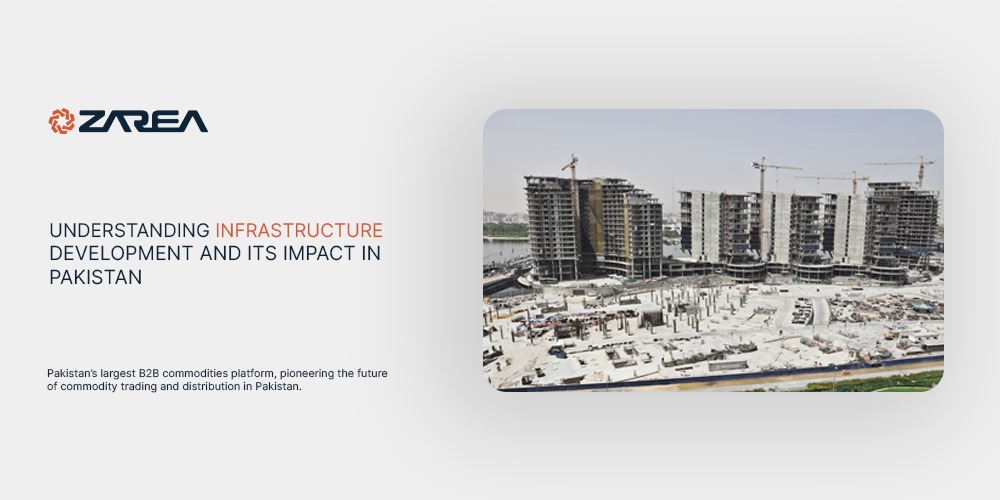Introduction – Infrastructure Development:
Infrastructure development in a country is the backbone that comprises a road transport system, utility structure, and public building process in relation to the needs of the citizens in the country and its economic activities. Suitable infrastructure promotes connectivity and enhances productivity, thereby contributing to viable urban and rural development. This robust infrastructure is quite needed in a country like Pakistan, which is burdened by an ever-increasing population, to satisfy their requirements of modern living and be more competitive in the world scenario.
Zarea is playing the most important role within this ecosystem, aggregating online marketplaces for construction materials. At our platform, vital resources, such as cement, steel, and bricks are available in order to make sure access to the top quality for any builder and developer is hassle-free so they could directly create value related to infrastructure growth in Pakistan.
The Role of Infrastructure in Urban Growth:
Urban expansion significantly contributes to economic progress, with infrastructure acting as its foundation. Cities rely on efficient transport systems, water supply, waste management, and housing to accommodate rising populations. In Punjab, infrastructure development has been central to improving urban living standards, boosting economic activities, and ensuring sustainable growth.
Key Initiatives Driving Urban Infrastructure in Punjab:
1. Punjab Cities Governance Improvement Project (PCGIP)
- Aimed at strengthening governance in five large cities from 2012 to 2017.
- Improved planning, resource management, and service delivery.
- Enhanced accountability and crisis-response capacities.
2. Intermediate Cities Improvement Investment Programme (PICIIP)
- Focuses on 12 intermediate cities (2016-2025).
- Addresses urban challenges through integrated planning and institutional reforms.
- Enhances urban infrastructure and service delivery.
3. Punjab Safe Cities Initiative
- Created in accordance with the Safe Cities Ordinance of 2015.
- Implements integrated command and communication systems for police.
- Focuses on public safety using technology and improved processes.
4. Smart Cities Initiatives
- Modern transport systems like the Metro Bus Service.
- Smart monitoring systems for schools and health facilities.
- GIS-based mapping for property tax automation and waste management.
5. Metro Systems in Punjab
- Inaugurated in Lahore, Rawalpindi-Islamabad, and Multan.
- Plans for rail-based Orange Line Transit in Lahore for a modern urban commute.
6. Waste Management Companies
- Active in prominent cities such as Lahore, Faisalabad, and Gujranwala.
- Aims at minimizing waste, increasing awareness, and creating secure disposal locations.
Impact of Infrastructure on Urban Growth:
- Economic Growth:
- Urban infrastructure like roads and transport systems stimulate economic activities.
- Increased connectivity improves trade and investment opportunities.
2. Better Living Standards:
- Access to clean water, improved waste management, and efficient housing uplift living conditions.
- Enhanced healthcare and educational facilities contribute to human development.
3. Employment Generation:
- Large-scale infrastructure projects create job opportunities.
- Urbanization encourages entrepreneurship and new businesses.
Challenges to Urban Growth:
- Overcrowding in cities like Lahore, with rising demands on housing and utilities.
- Environmental concerns due to pollution and inefficient waste disposal systems.
- Unequal resource allocation, favoring larger cities over smaller urban centers.
Recommendations for Sustainable Urban Growth:
-
Balanced Urbanization:
- Invest in intermediate cities to reduce the pressure on large urban hubs.
- Develop a network of urban centers connected through efficient infrastructure.
2. Environmental Sustainability:
- Introduce green technologies in construction and waste management.
- Expand water treatment and recycling facilities.
3. Technological Integration:
- Use GIS mapping for urban planning and resource management.
- Enhance public transport with smart systems for greater efficiency.
Key Infrastructure Development Projects in Pakistan:
Pakistan has initiated multiple mega infrastructure projects, of which most will be transformational towards the future. Its major initiatives entailed the China-Pakistan Economic Corridor, prioritizing road, port, and energy projects in relation to the Diamer Bhasha Dam conceptualized to solve twin water-accumulation and electrical issues. Projects like these, promoting economic growth, reduction in the shortfall of energy, and connection, are highly remarkable.
At Zarea, we recognize the importance of these projects and provide specialized construction materials tailored to meet the requirements of such large-scale undertakings. Our partnerships with trusted suppliers ensure the availability of high-grade materials for these nation-building projects.
Challenges in Rural Infrastructure Development:
While urban areas often receive significant investment, rural regions in Pakistan face distinct challenges. Insufficient road infrastructure, restricted access to utilities, and lack of healthcare and education services impede rural growth. Infrastructure in these regions is essential for enhancing living conditions, fostering economic activities, and linking rural populations to urban markets.
The Economic Impact of Modern Infrastructure:
Modern infrastructure acts as a catalyst for economic growth. Efficient transport systems reduce logistics costs, reliable energy sources enhance productivity, and well-designed urban spaces attract investment. Pakistan’s economic growth is closely tied to its ability to modernize infrastructure and integrate it with global trade and commerce.
Zarea aligns with this vision by streamlining the supply chain for construction materials. Our sophisticated supply chain management system enhances inventory and delivery operations, guaranteeing that materials arrive at projects punctually and within budget.
Sustainable Infrastructure for Future Generations:
Sustainability is a crucial aspect to consider in modern infrastructure endeavors. Sustainable methods not only preserve resources but also lessen the ecological effects of progress. In Pakistan, the integration of renewable energy, sustainable building materials, and waste management solutions in projects is increasing in popularity.
Zarea is dedicated to advocating for sustainable building methods. We provide environmentally friendly materials and solutions, assisting builders in achieving sustainability objectives while ensuring cost efficiency.
How Technology is Transforming Infrastructure:
Technology is transforming infrastructure development, facilitating smart cities, innovative construction methods, and effective project management. From AI-driven design to automated machinery, technology enhances accuracy and reduces costs in infrastructure projects.
Zarea utilizes technology to enhance the purchasing experience for its clients. Our AI-driven demand prediction and smart order handling guarantee that customers obtain prompt suggestions and solutions customized to their individual requirements. This technological edge positions Zarea as a leader in Pakistan’s construction material industry.
Government Policies and the Pakistan Infrastructure Report:
Government policies hold the key to shaping the course of infrastructure development in Pakistan. They create an enabling framework, stimulate investment, and offer incentives that overcome infrastructure gaps in the country. The Pakistan Infrastructure Report provides valuable insights into such policies and strategies for the enhancement of infrastructure financing and implementation.
Key Highlights of Government Policies:
1. Public-Private Partnerships (PPP): A Core Strategy
- The government acknowledges PPPs as crucial for closing the infrastructure investment gap.
- PPPs entail cooperation between the public and private sectors to fund, build, and oversee infrastructure initiatives.
- Key benefits include risk-sharing, innovation, and efficient resource allocation.
2. Infrastructure Financing Mechanisms
- Creation of the Infrastructure Project Development Facility (IPDF) to support project planning and implementation.
- Establishment of the Infrastructure Project Finance Facility (IPFF) to aid in financial matters, including offering loans and grants to ensure the viability of PPP projects.
3. Sector-Specific Recommendations
Power Sector:
- Concentrate on expanding the energy mix by incorporating renewable energy sources such as wind and solar.
- Privatization of electricity distribution firms with incentives tied to performance.
- Adoption of cost-based tariffs to draw in investors.
Roads:
- Strategies to encourage Build-Operate-Transfer (BOT) frameworks for roadway development.
- Streamlined land acquisition processes to reduce project delays.
Water and Sanitation:
- Adoption of best practices in public-private collaboration for efficient service delivery.
- Expansion of water recycling and wastewater treatment facilities.
4. Incentives for Private Sector Involvement
- Tax exemptions and financial incentives for investors in infrastructure.
- Streamlined regulatory processes to minimize delays and reduce administrative hurdles.
- Introduction of credit enhancements and viability gap funding to make projects more attractive to private investors.
5. Institutional Support
- Strengthening regulatory bodies like NEPRA (for the power sector) to ensure transparent and fair pricing mechanisms.
- Establishment of independent bodies to monitor PPP projects and ensure compliance with standards.
Challenges and Policy Improvements:
- Addressing inefficiencies in tariff structures and reducing transmission and distribution losses in the power sector.
- Encouraging investment in underdeveloped areas by creating targeted subsidy frameworks.
- Promoting innovative solutions to improve project financing and delivery.
Conclusion – Building a Better Tomorrow:
- Infrastructure development is something beyond the mere economic driver; rather, it is a base upon which societal progress and national pride depend. For Pakistan in particular, prioritizing infrastructure is necessary both in urban and rural settings to unlock its full potential on the global stage.
- Zarea is proud to be a part of this journey, made possible through the power of builders, developers, and contractors with the means. While innovating and expanding, the commitment remains very strong-to contribute toward infrastructure development and make Pakistan a stronger, connected, and sustainable nation.
References:
- Infrastructure: Infrastructure Development – Wikipedia.org
- Infrastructure: Role of Infrastructure in Urban Growth – Peri.punjab.gov.pk
- Report: Government Policies and the Pakistan Infrastructure Report – Sbp.org.pk
- Transforming Infrastructure: Technology is transforming infrastructure – Ciohub.org

































